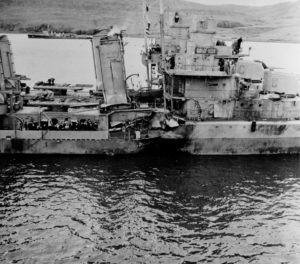Why did the U.S. not react to attacks on three American destroyers by U-boats in Oct. 1941?


We all know the U.S. entered World War II on December 7, 1941 when the Japanese attacked our Pacific Fleet at Pearl Harbor.
Why didn’t we go to war when Germany attacked three of our destroyers weeks and months before Pearl Harbor?
On September 4, 1941, the USS Greer (DD-145), (near left) a WW-I era Wickes class, was about 175 miles from Iceland with a load of mail and supplies, when she got a warning from some British ships that U-boats were in the area. The Greer soon made sonar contact, but did not make a run at the submarine. Just before 1:00 p.m. lookouts spotted a torpedo, then a second one. The Greer responded by dropping eight depth charges, then 11 more over three hours. No debris ever surfaced.
Three days later, President Roosevelt made a radio address where he warned: “From now on, if German or Italian vessels enter the waters [meaning American defensive waters], the protection of which is necessary for American defense, they do so at their own peril.”
But, he did not ask Congress for a declaration of war.
On October 17, 1941, the USS Kearney (DD-432), (far left) a one-year-old Benson class, was part of an escort for SC48, a 53-ship convoy heading to Great Britain, when she was forced to go dead in the water when a British corvette cut across her bow. The U-568 took the opportunity to fire a spread of three torpedoes. One hit on the Kearny’s starboard side, killing 11 American seamen. The Kearney was able to make port.
The President responded with another speech in which he said: “America has been attacked.” Later in the speech he said: “The forward march of Hitler and Hitlerism can be stopped – and it will be stopped. “ Later he said the U.S. Navy had been given orders to “shoot on sight.”
But, FDR did not ask Congress for a declaration of war.
On October 30, 1941, the USS Reuben James (DD-245), a tired Clemson class that had been at sea for 20 years, took a torpedo in the port side from the U-552. While the Kearny’s new 5/8th inch thick tempered steel stood up to its torpedo, the 20-year-old 3/8th inch thick rolled steel of the Reuben James did not. The forward magazine exploded, breaking the ship in half. More than 100 men were killed , including all of the officers.
Still, the President did not ask Congress for a declaration of war.
More than 110 Americans had been killed in three separate U-boat attacks on American destroyers in two months, but President Roosevelt did not directly retaliate against Germany.
Historical opinion is that FDR did not push for war against Germany for the loss of the two destroyers because he did not yet have the bulk of the American public behind him. In late 1941, many Americans were not even sure they liked the idea that the U.S. was providing convoy escorts for the merchantmen heading to Great Britain.
Curiously, while the U.S. government was not particularly angry about the loss of 110 American seamen to two German U-boats, a pacifist singer was. Woody Guthrie recorded The Sinking of the Reuben James asking: “Did you have a friend on that Good Reuben James?”